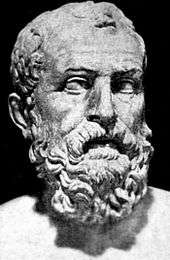Aegimius
Aegimius (Greek: Αἰγίμιος) was the Greek mythological ancestor of the Dorians, who is described as their king and lawgiver at the time when they were yet inhabiting the northern parts of Thessaly.[1] He asked Heracles for help in a war against the Lapiths and, in gratitude, offered him one-third of his kingdom. The Lapiths were conquered, but Heracles did not take for himself the territory promised to him by Aegimius, and left it in trust to the king who was to preserve it for the sons of Heracles, the Heracleidae.[2][3]
Aegimius had two sons, Dymas and Pamphylus, who migrated to the Peloponnese and were regarded as the ancestors of two branches of the Doric race, the Dymanes and the Pamphylians of Anatolia, while the third branch, the Hylleans, derived its name from Hyllas, the son of Heracles, who had been adopted by Aegimius.[4]
There existed in antiquity an epic poem Aegimius of which a few fragments are extant,[5] and which is sometimes ascribed to Hesiod and sometimes to Cercops of Miletus.[6] The poem, printed among Hesiodic fragments,[7] survives in fewer than a dozen quotations, and seems to have been in part concerned with the myth of Io and Argos Panoptes.
References
- ↑ Pindar, Pythian Odes i. 124, v. 96
- ↑ Pseudo-Apollodorus, Bibliotheca 2. 7. § 7
- ↑ Diodorus Siculus, 4. 37
- ↑ Pseudo-Apollodorus, Bibliotheca ii. 8. § 3; Scholia on Pindar, First Pythian Ode, line 121
- ↑ Schmitz, Leonhard (1867), "Aegimius", in Smith, William, Dictionary of Greek and Roman Biography and Mythology 1, Boston, p. 26
- ↑ Athen. xi. p. 503; Stephanus of Byzantium, s.v. Αβαντίς
- ↑ Hesiod: Fragments, translated by Hugh G. Evelyn-White, 1914: on-line text.
Sources
 This article incorporates text from a publication now in the public domain: Smith, William, ed. (1870). "article name needed". Dictionary of Greek and Roman Biography and Mythology.
This article incorporates text from a publication now in the public domain: Smith, William, ed. (1870). "article name needed". Dictionary of Greek and Roman Biography and Mythology.
| ||||||||
